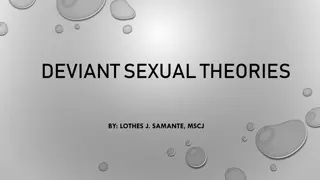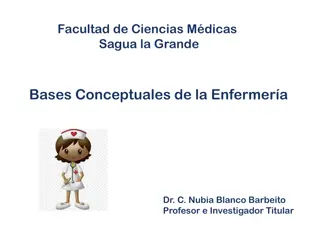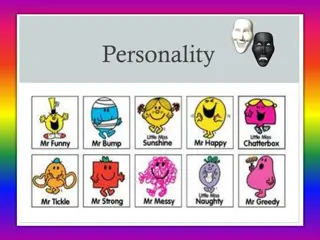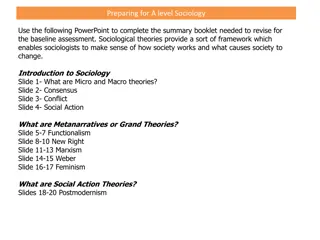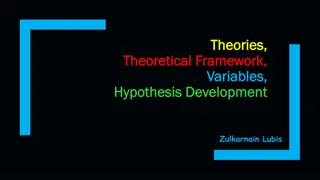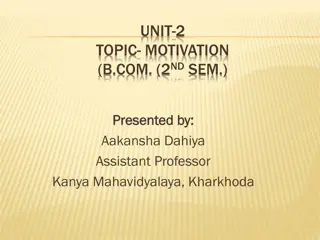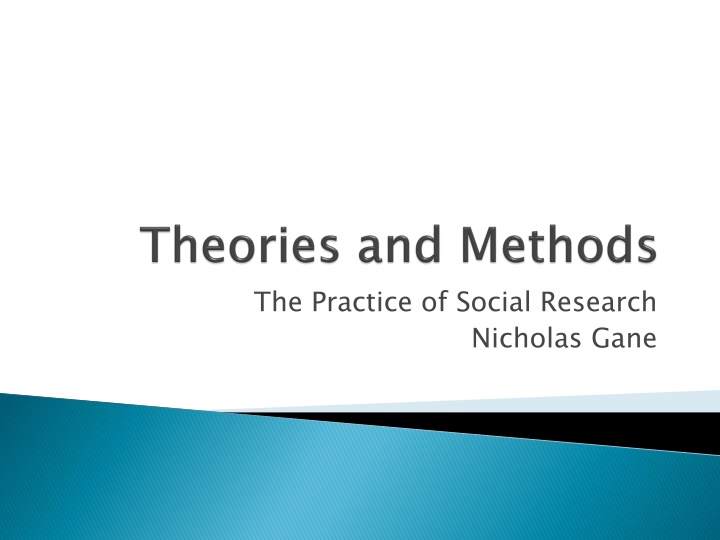
Exploring Theory and Method Integration in Doctoral Research
Delve into the connection between theory and method in doctoral research, examining how they relate to research questions and can be effectively integrated. Explore the nuances of theoretical work and the varied approaches across different PhD disciplines, reflecting on the complexity of producing knowledge and the diverse models and methods employed in research. Consider key concepts from prominent scholars like C.W. Mills and Roy Bhaskar to deepen your understanding of epistemology and the philosophical underpinnings of research practices.
Download Presentation

Please find below an Image/Link to download the presentation.
The content on the website is provided AS IS for your information and personal use only. It may not be sold, licensed, or shared on other websites without obtaining consent from the author. If you encounter any issues during the download, it is possible that the publisher has removed the file from their server.
You are allowed to download the files provided on this website for personal or commercial use, subject to the condition that they are used lawfully. All files are the property of their respective owners.
The content on the website is provided AS IS for your information and personal use only. It may not be sold, licensed, or shared on other websites without obtaining consent from the author.
E N D
Presentation Transcript
The Practice of Social Research Nicholas Gane
The purpose of this session is to think about the status of theory and method within your own doctoral research Regardless of all disciplinary backgrounds, all PhDs contain elements of theory and method to greater or lesser degree How are theory and method connected to your research questions? How can they be integrated? We will read C.W. Mills as a way into some of these questions
No work is purely empirical. It is always related to questions of epistemology how we can know the world; the status or type of knowledge that we want to produce; the choice of models or methods that we want to use for a research, and so on There is no single model of PhD some are densely theoretical, others are more empirical and deal more with different types of data Question: what makes for good theoretical work?
From 1995 to 1998 the journal Philosophy and Literature ran a bad writing contest Readers nominated passages from different scholarly texts Many of the good and the great were nominated and were awarded this prize, including figures such as Judith Butler and Fredric Jameson The 1996 winner was Roy Bhaskar for a passage from his Plato etc: The Problems of Philosophy and Their Resolution (Verso, 1994)
Indeed dialectical critical realism may be seen under the aspect of Foucauldian strategic reversal of the unholy trinity of Parmenidean/Platonic/Aristotelean provenance; of the Cartesian- Lockean-Humean-Kantian paradigm, of foundationalisms (in practice, fideistic foundationalisms) and irrationalisms (in practice, capricious exercises of the will-to-power or some other ideologically and/or psycho-somatically buried source) new and old alike; of the primordial failing of western philosophy, ontological monovalence, and its close ally, the epistemic fallacy with its ontic dual; of the analytic problematic laid down by Plato, which Hegel served only to replicate in his actualist monovalent analytic reinstatement in transfigurative reconciling dialectical connection, while in his hubristic claims for absolute idealism he inaugurated the Comtean, Kierkegaardian and Nietzschean eclipses of reason, replicating the fundaments of positivism through its transmutation route to the superidealism of a Baudrillard .
1). A tendency to name drop (Aristotle, 2013; Baudrillard 1993; Hayek, 1948; Ignatieff, 2005; Marx, 1968; Mises, 1933; Plato, 1993) What work do these references do? How do they embellish your position or argument? 2). A tendency to be too devoted to a single thinker as if the truth always lies with their work. References to other figures are of course important but don t be afraid to find you own theoretical voice.
3). A tendency to hide behind theory. What is it you want theory to do in your research? Coupled with this is a tendency to use an overly complex theoretical style in order to make work look intellectually sophisticated The biggest challenge is to write about challenging things in a way that is clear and accessible while at the same time intellectual and scholarly Beyond the PhD, this is especially important if you want to your research to reach an audience beyond the academy. Who are you writing for?
Many of these problems are addressed by C. Wright Mills in his famous work The Sociological Imagination (1959) He parodies the grand theory of his fierce rival Talcott Parsons by translating some passages from his book The Social System into English His verdict: Grand theory is drunk on syntax, blind to semantics (p.42) A way of thinking that fetishises concepts and works at such a high level of generality that it is always far removed from any empirical context
Mills aim is to help grand theorists get down from their useless heights (p.42) a provocation to think about the uses of high theory His answer: every self-conscious thinker must at all times be aware of and hence be able to control the level of abstraction on which he is working. The capacity to shuttle between levels of abstraction, with ease and clarity, is a signal mark of the imaginative and systematic thinker (p.43).
Mills is critical of social science that is made up of a network of general concepts that have little if any connection to the empirical world He warns against the use of concepts as sponge-words : concepts as abstract forms or catch-alls that lack clear definition Be clear about what you mean when you use concepts, in particular big ones such as economy, society, gender, race, power and so on And remember that concepts are contested
By the end of the third chapter of this work, Mills reveals what is really at stake in social science research: problems He says that the withdrawal into systematic work on conceptions should be only a formal moment with the work of social science (p.58) Again, a provocation: to think carefully about the problems and questions that guide our research and to think about the theoretical resources most suited for dealing with these In other words: theory should fit the problem, not vice versa
Some common problems encountered in doctoral social science research: A tendency to make the methodological techniques define the problem in hand An unwavering dedication to certain methodological approaches (be these either quantitative or qualitative) A tendency to over-complicate matters by introducing too many research techniques Uncertainty about the scale of the research project
Mills offers a number of provocations on the question of method (and these are even fiercer than his statements on theory) He talks about a methodological inhibition that runs parallel to grand theory: what he calls abstracted empiricism This is a form of methodological work that fetishes techniques over the formulation of methods in response to particular problems
Mills is critical of the tendency for Methodology to determine the problems (p.67). He questions the common strategy of starting with ready-made methods that then determine the types of research we can do Again, as with grand theory, he argues that such an approach is back-to-front: methods should be developed in response to the problems we want to address, not vice versa
Mills encourages us to think creatively about the question of method He says: no method, as such, should be used to delimit the problems we take up, if for no other reason than that the most interesting and difficult issues of method usually begin where established techniques do not apply (p.83). This raises further questions about the originality of your work something we will look at further next week
Be careful not to fetishize theory and method for their own sake The danger of grand theory is that it leads to formal and cloudy obscurantism And of abstracted empiricism that it is little more than formal and empty ingenuity (p.86) We can use theory and methods in highly technical ways, but how do they cast light on empirical problems or, in the context of the PhD, our research questions?
Mills offers us a provocation to think about the status of theory and method in our work He urges us to think creatively about these theory and methods Theory and method should fit our research questions, not the other way around Don t lose yourself in a world of conceptual jargon or methodological abstraction The integration of theory and method should be born out of a drive to address problems
The craft of social science lies in the ability to master theory and method rather than be mastered by them Mills: To have mastered method and theory is to have become a self-conscious thinker, a man at work and aware of the assumptions and the implications of what he is about. To be mastered by method or theory is simply to be kept from working, from trying, that is, to find out about something that is going on in the world (p.135).

